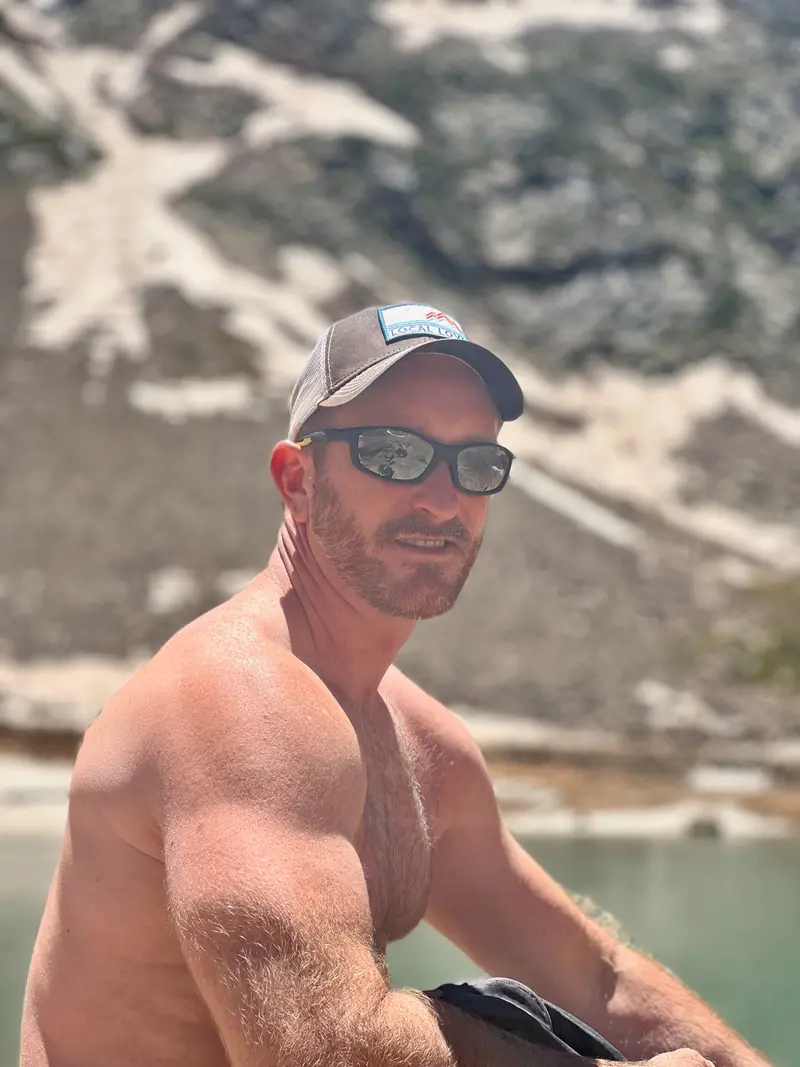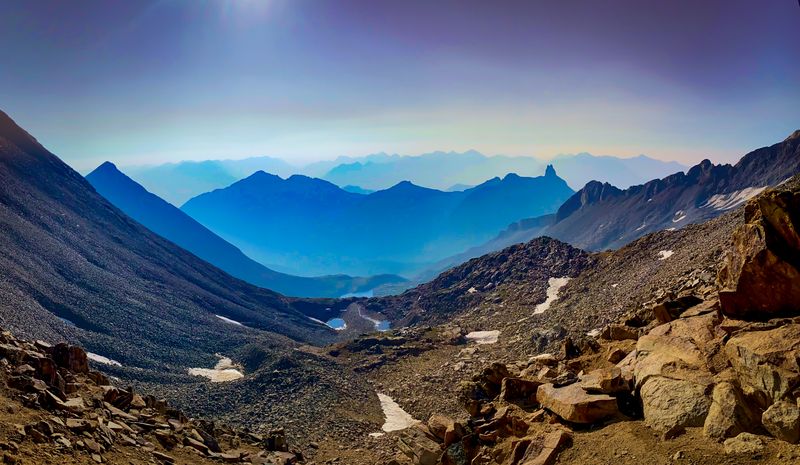Training for Trekking
Dallas, Texas
Above photo by Terri Glanger.
** When training for a high-altitude trek like EBC, it’s important to tirelessly talk about it to everyone you meet, and to do it shirtless so they find it more interesting. People will politely try to get away from you, but don’t they know you love a challenge? Double down and talk about your upcoming trip and your training routine more intensely!

*******************
The following was written in the summer of 2022, several months before leaving for Nepal.
******************************
I don’t yet know what LANDSCAPING SECRETS the Himalayas are going to reveal, because as of this writing I have yet to go, but I have been training for the EBC and vigorously preparing for this high-altitude trek for quite some time now, and finally, the time is nigh! I leave for Nepal in late October.
You will notice that even though I will be hiking up Mt Everest for two weeks straight, and reaching a height of over 18,000 ft, I have learned to use the lesser-known acronym EBC when talking about what I’m doing. You learn to esoterically tell people you are hiking the EBC trek and then -- only if you absolutely must—explain that it stands for Everest Base Camp. You do not say that you’re hiking Mount Everest. I’ve learned this the hard way. The second you utter the word Everest, everyone starts asking if you are going to summit Mount Everest, and then they are palpably, visually, and vocally disappointed when they find out you’re not. “Hey Bro! Stop folding those shirts and get over here! This guy’s going to the top of Mount Everest!”
And now a small crowd has gathered in the Eddie Bauer store, just in time to hear me explain— or more apologize, really— that I’m not actually planning to summit Mount Everest, I’m just hiking up to Base Camp.
“Just,” as if this is some small feat. It’s like I’ve already given up.
And trust me, that’s what people will act like when they learn you aren’t actually planning to go to the top of Mount Everest. Unable to help themselves, they will immediately start asking you “Why not? Why aren’t you going all the way to the top?”
Forget the fact that the classic Inca Trail to Machu Picchu tops out at only13,828 feet, and I watched half a dozen people get carried down on stretchers due to altitude sickness or injury, and at least twice that many people were simply unable to make it all the way to the end due to other health reasons. Well, the EBC Trek that I’m preparing to hike will take me to an elevation of over 18,000 ft above sea level, over the course of 15 days, and 60% of all hikers who attempt this don’t actually make it all the way to Base Camp.
But never mind all that, now I have a store full of people, both customers and employees alike, that are all crestfallen that I won’t be summiting the tallest mountain in the world. It’s irrelevant that it was never my intention to do so, they just heard the word "Everest," and then that, sadly, I’m not going to be able to make it all the way.
This is why you avoid ever saying the word “Everest” in these public situations.
An employee in REI even became so involved that he shouted at me, “C’mon, Man! You can do this, you’re so close!” As if right there in his camping section of the store, in Dallas, Texas, his enthusiastic motivation was going to be just the extra push I needed to go the extra mile and complete this thing I never actually set out to do.
(Actually, it’s an extra 12.5 mile from Base Camp to summit, but who’s counting?)
Everyone in every recreational adventure store, that’s who.
I heard a woman in the Columbia store actually turn to her friend and whisper as much.
“What’s going on?” her friend asked.
“Oh, this man is hiking Mount Everest, but he’s decided not to go all the way to the top.”
This was whispered in hushed tones— out of respect for me, I guess? Or possibly her embarrassment at my failure?
“What a shame,” I’m pretty sure I heard her friend solemnly whisper in return.
To put it into perspective, imagine that you are planning an exciting beach vacation somewhere exotic. Maybe you’re even nervous, because it will be your first attempt at SCUBA DIVING. Or maybe just your first time swimming in the Atlantic! But every time you go to tell someone about it— which is frequent, due to your mix of excitement and nervousness, combined with all the things you need to purchase for your trip— they are only disappointed to learn that you won’t, in fact, be swimming all the way to Great Britain.
What a shame.
I should try this next time I overhear someone talking about their vacation plans in the bathing suit section of Target.
I’ll turn to my friend and solemnly whisper, “Yeah, I hear she’s going to be swimming in the Atlantic, but sadly, I don’t think she’s going to be able to swim all of it. What a shame…”
A challenge (and possible disappointment) that I am prepared for is how I am going to possibly extrapolate any useful landscaping advice or inspiration from a trek that occurs almost entirely above the tree line. If the COLORADO 14ERS I have hiked in preparation for the EBC are any indication of what I’m to find on Everest, then once you get to a certain altitude, all plant life pretty much ceases to exist, and you find yourself in a barren, almost lunar, landscape of only scree and rocks.

I suppose it is kind of beautiful? In a sort of desolate, existential sort of way? But certainly not anything I’d want to try and recreate back in my yard at home in Dallas any time soon. Sadly, most hikes above the tree line always remind me of abandoned mining camps. They always just look like a bunch of churned up, craggy grey rock piles—devoid of life—where some huge machine took everything of value or beauty and then moved on. (Even though I know this isn’t the case, this is what it looks like to me, I find it somewhat depressing, and I don’t care for it. What can I say? I like plants!).
I suspect that most any landscaping and decorating inspiration I will derive from Nepal will be from the gorgeous Buddhist, Hindu, and Tibetan culture I experience in monasteries and tea houses along the way, and especially in Kathmandu.
Already it has occurred to me that a Tibetan singing bowl could easily hold a potted plant.
But then, just like putting a bird in a cage, you are robbing it of its inherent purpose—the thing it was born to do—and essentially telling it, “You may never sing again.”
Pretty profound, huh?
Did I mention I’ve also been going to a Buddhist temple lately? To soak in some of the culture and religion beforehand.
I’ve already learned quite a lot, for example, Buddhist culture is all about renouncing worldly possessions. And this starts almost immediately, as you are asked to renounce 20 of your American dollars at the door upon entry; because worship service at the Buddhist temple in Dallas surprisingly costs money. Who knew?
Also, I have learned the word “Namaste.”
This is something that people often say to you when you tell them you are planning to hike Mount Everest (but not to the summit, just to Everest Base Camp.)
So I can only assume that roughly translated, Namaste probably means, “you’ve already given up; what a shame.”
***************************
If you'd like to know more about the EBC, stories from my adventures in the Himalayas are scattered throughout this website, but HERE is probably the best place to start.